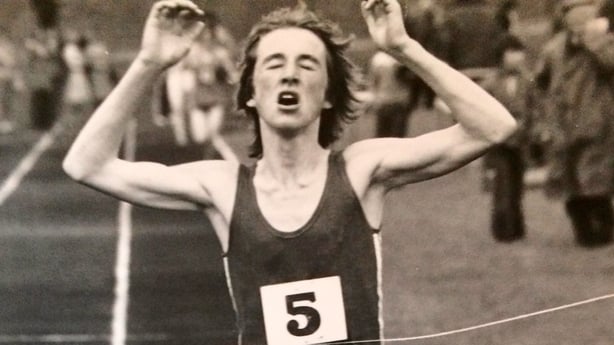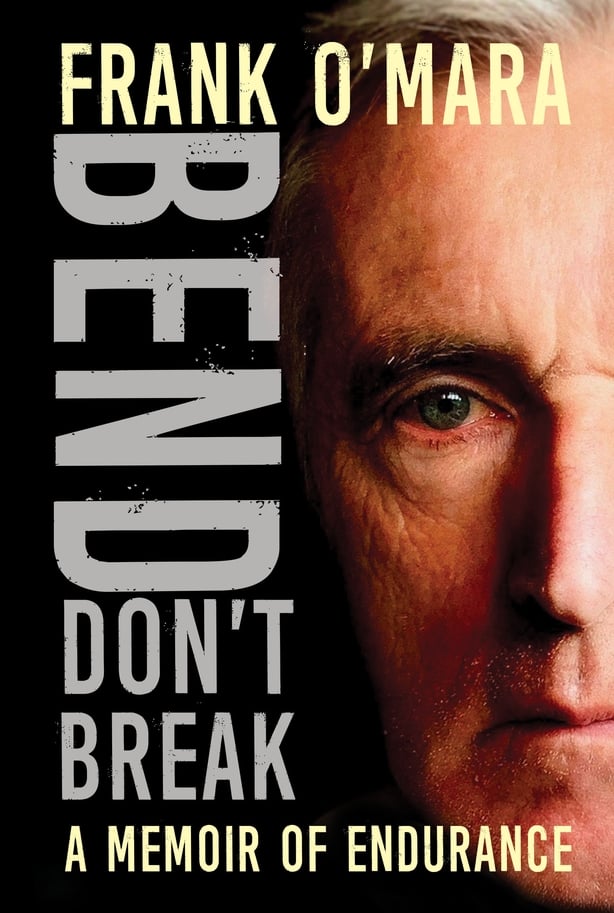We present an extract from Bend Don't Break, the new memoir from Irish Olympian Frank O’Mara.
Victory is a life well lived or a day enjoyed...
Limerick man Frank O’Mara had the athletics career most only dream of, competing for Ireland in three Olympic Games and breaking Irish and world records. After his retirement from running, he settled in the US with his family and made his way to the top of the telecoms industry. Then, at age forty-eight, his life changed forever when he was diagnosed with early onset Parkinson’s disease. The progression was rapid, causing severe muscle cramps, tremors, and eventually the inability to walk and at times even speak. In this inspiring memoir, Frank recounts his battle with Parkinson's.
Sometimes you have to accept the unbelievable
The event that finally forced me to face reality didn’t happen in a doctor’s office or a hospital.
I didn’t feel the true weight of my diagnosis until my friend Gary Taylor came over to check on us at home.
Gary was aware that I’d been struggling with some sort of malady for months. He’d followed my effort to treat my issue as a sports injury. When my sports medicine specialist said it might be a little more complicated than that, I saw a spine-doctor to rule out spinal stenosis. Next up, the neurologist.
Gary knew I’d seen a neurologist earlier that week, but he didn’t know what, if anything, we’d learned.
The doctor had performed what seemed to be perfunctory tests, nothing elaborate: routine hand motions, finger tapping, foot stomping, and basic balance and gait tests. The exam only lasted about ten minutes. The doctor’s response had been quick and precise. 'I’ve seen this often enough to recognise it. There is a slowness in your movement on the left side. I’m sorry to have to tell you this. You have Parkinson’s disease.’
I took his assessment with a degree of scepticism.
‘What baffles me is, I came in with a running problem and I’m leaving with an old person’s neurological disease,’ I said.
The doctor just shook his head, but I pressed on. ‘I’m only forty-eight years old.’

The doctor had then proposed a way I might postpone reality a little longer. ‘I suggest that you take a drug called Sinemet, which is used to treat the symptoms of the disease,’ he said. ‘If you see an improvement, then you know you have Parkinson’s. If you don’t, then you know I’m wrong.’
I didn’t know Dr Archer very well at that point, but I appreciated that he refrained from adding, ‘I think you’ll find that I am right.’ Since then, I have given him many opportunities to say, ‘I told you so,’ but he never has.
On my way home from the neurologist, I had called my wife, Patty, and rattled on about having no visible symptoms, so what improvement would I even look for? She humoured me, which only served as reinforcement in my confused mind. As I saw it, I was just trying to get to the bottom of a chronic injury that prevented me from running and was now beginning to interfere with my walking.
‘I don’t have a single symptom the doctor could point to,’ I persisted. ‘I don’t even have a tremor!’
As usual, Patty gave wise counsel. ‘Why don’t I pick up the medicine this afternoon, and you can give it a go like he’s suggested?’ she said. ‘Why don’t you try it?’
It was a few days later that Gary came by. I was upstairs when I heard him knock on the front door. I looked out the window and saw his truck parked out front. I thought he’d come by to discuss the startup of a running store. I wasn’t a great fan of retail, so I was a little anxious about the conversation. It took me a few minutes to finish what I was doing, then I headed down to the kitchen.
As I descended the stairs, I heard voices and what sounded like sobbing. I stopped for a moment to listen and heard Gary’s voice above my wife’s muffled crying. I listened a little while longer, but their hushed voices were indecipherable. I continued down to the landing and turned the corner into the kitchen. Neither Gary nor Patty had heard me coming and my sudden appearance surprised them.

I felt like I’d crashed the party. The look on both their faces said it all. I could tell they were guilty of some deceit. Gary had his arm around Patty. If I hadn’t known them both so well, I would have thought they were about to admit to a clandestine affair. I almost excused myself for interrupting. Confused, uncertain what emotion to deploy, I just peered at them. I will never forget the stricken looks on their faces.
Gary saw my perplexed stare and broke the silence. ‘God, I am so sorry, Frank!’
It was then I realised what they were trying to hide from me. Patty had told Gary about my doctor’s visit earlier in the week.
‘So, you heard the news, did you?’ I blurted out.
‘I did, and I feel awful for both of you,’ Gary replied.
Then he hugged me. It was one of those long hugs, the kind given when no words are readily available. Gary clinched tighter before he released me.
‘You’re strong,’ he said. ‘You got this.’
I wanted to impress on him my disbelief, to tell him how wrong the doctor must have been, how little evidence there was to support the diagnosis. After all, Gary was a runner and should know about injuries. But there was a firmness in his eyes and a resolve in his voice that caused me to repress the urge.
There was nothing else to do except cry. We sobbed.
Their faces shocked me to my core. It was especially horrifying to see my beautiful wife look so worried. She had accepted my disbelief because she knew it might take time to accept, let alone digest the news. On the other hand, she had no reason to disbelieve the doctor. That was the moment I knew I was facing a monstrous challenge. I couldn’t keep reality at bay any longer.
I had early onset Parkinson’s disease at the age of forty-eight.

Bend Don’t Break is published by The O’Brien Press

